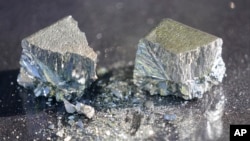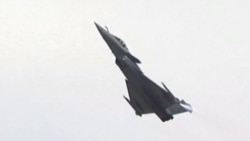Their names are difficult to pronounce, they're essential for modern manufacturing, and they're increasingly at the center of the escalating trade war between the United States and China.
The global supply of these rare earths -- an essential group of 17 elements that find themselves in everything from electric vehicle batteries to vital defense technology -- are also mostly controlled by China.
Beijing is now looking to use that strategic leverage amid the growing trade spat and rising tensions with Washington.
In response to recently imposed tariffs, China restricted sales to the United States of seven rare earths. While not an outright ban, the move requires producers to apply for export licenses from the Chinese government, and there's growing concern it will lead to price and supply shocks that could hit US defense companies particularly hard.
"What oil was to the 20th century, rare earth minerals are to the 21st," said Sean McFate, an adjunct professor at Syracuse University's Maxwell School of Citizenship and Public Affairs. "Microchips, green technology, and quantum computing all require rare earths, and China has the bulk of them. It's a national security imperative that goes beyond the stock market."
Beijing controls more than two-thirds of global rare earth production and more than 90 percent of processing capacity. China also effectively holds a monopoly over the supply of global heavy rare earth processing, a subset of the elements used in the US defense sector to make powerful magnets crucial to the production of fighter jets, warships, missiles, tanks, and lasers.
It remains to be seen exactly how China will implement these new restrictions, but a report from the Center For Strategic And International Studies (CSIS), a Washington-based think tank, warned they will likely result in a pause in exports as Beijing establishes the licensing system and cause disruptions in supply to some American firms, particular those in the national security sector.
"The United States is particularly vulnerable for these supply chains," stated the April 14 report. "There is no heavy rare earths separation happening in the United States at present."
How Is China Restricting Rare Earths?
The new export restrictions apply to seven medium and heavy rare earths: samarium, gadolinium, terbium, dysprosium, lutetium, scandium, and yttrium, all of which play a large part in the defense sector.
Yttrium, for example, is used as a high-temperature coating for jet engines that stops them from melting mid-flight.
Analysts say Beijing is looking to leverage this dependency.
While the Pentagon and US firms maintain reserves, they are not estimated to be large enough to outlast a sustained disruption to the supply chain. In addition to the ban on the elements themselves, Beijing also placed 16 US entities -- all but one of which are in the defense and aerospace industries –- on its export control list, limiting them from receiving dual-use goods including the rare earths.
Dimitar Gueorguiev, an associate professor at Syracuse University, says he sees the latest restrictions more as a move by Beijing to signal "its ability to throttle these exports should the trade war escalate further."
"It's important to keep in mind that most importers have had this concern on their horizon for some time now so are likely stockpiled for at least a few months," he said.
Still, the measures and the ability to escalate them are a formidable tool for China. Beyond its ability to curb supply, Beijing's market dominance also allows it to dictate prices, meaning it can raise costs for certain customers or undercut rare earth supplies outside its control by keeping rates low.
This was seen in past measures implemented by China. In 2023, Beijing restricted exports of gallium and germanium, which are used in chips, radars, and satellites. This was followed by a full ban on their export to the United States in December 2024.
Since then, prices have skyrocketed and the global market has fractured. Gallium bought from Western countries is two to three times more expensive than that bought in China, according to the consultancy Project Blue.
The CSIS report also warns that Chinese export controls pose a direct threat to the US military's readiness, adding to concerns raised by lawmakers and analysts that it lags behind in its defense manufacturing.
"Even before the latest restrictions, the US defense industrial base struggled with limited capacity and lacked the ability to scale up production to meet defense technology demands," the report states.
The report's authors cite an estimate -- by a US Air Force official in 2022 -- that China is acquiring advanced weapons systems and equipment five to six times faster than the United States.
"Further bans on critical minerals inputs will only widen the gap, enabling China to strengthen its military capabilities more quickly than the United States," the report concludes.
How Can The US Respond?
Facing pressure from China, experts say the United States needs to enact policies to shore up production at home and look into new sources abroad.
As recently as the 1980s, the United States was a leader in rare earth production, but price increases led to its flagship, the Mountain Pass mine in California, to shut down in the early 2000s.
That mine has since reopened and successive US administrations, including President Donald Trump's in his first term, have allocated investment for rare earth extraction and refinement facilities.
But catching up to China in rare earths as well as other critical minerals is time-intensive and costly. Some working in the sector also said other parts of the tariffs implemented by Trump could have knock-on effects making it difficult to scale up quickly with rare earth production.
On the Rare Earth Exchanges podcast, industry entrepreneur Daniel O'Connor said tariffed materials like steel and aluminum are crucial in mining and processing. "Let's not do tariffs on things we need to build our infrastructure," he said.
Against this backdrop, the United States has also been looking to secure supplies overseas, with the Trump administration looking to get greater access to rare earths and other critical minerals in Greenland and Ukraine, where Kyiv and Washington are reportedly close to achieving a deal.
Washington has also sponsored new mines in Brazil and South Africa, and the United States is funding the first major heavy rare earth processing facility outside of China, in Texas, although it will take years before it can show results.
In the meantime, Beijing is expected to keep flexing its rare earth metals as tensions flare with Washington.
"This has become part of Beijing's playbook when pushing back against Washington," Neil Shearing, group chief economist at Capital Economics, wrote on April 14.
"The weaponizing of this control over critical minerals -- and the race by other countries to secure alternative supplies -- will be a central feature of a fractured global economy."














